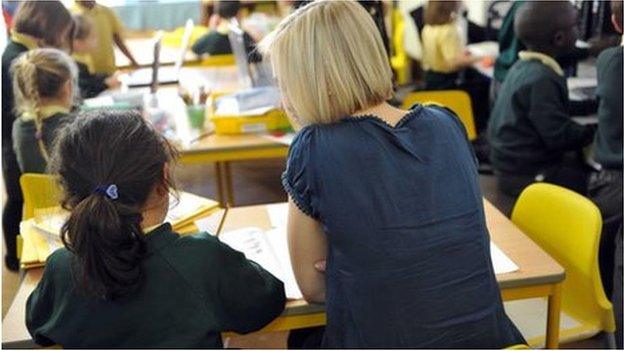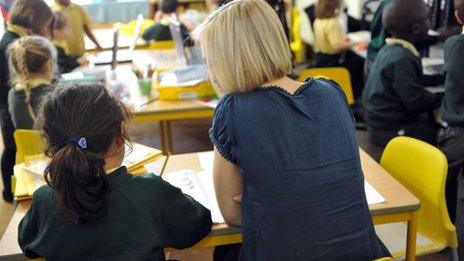More funding for school language teaching
- Published

The aim is for pupils to be learning a third language by primary 5
The Scottish government has announced £7m of funding for the teaching of foreign languages in schools.
The money, a 44% increase on the £5m allocated last year, is designed to help local authorities implement the European Union 1+2 languages mode.
The government's ambition is for every pupil to start learning a second language in the first year of primary school by 2020.
They will also begin to learn a third language in primary 5 at the latest.
This will bring Scotland into line with many other European countries, where learning a second language starts in early primary school and learning three languages is common.
Alasdair Allan, the minister for learning, said: "In today's global, multi-cultural world it is more important than ever that young people have the opportunity to learn languages from an early age.
"The ability to speak different languages will equip Scotland's young people with the skills and competencies needed in a 21st century global marketplace.
"We want to ensure the enthusiasm for languages starts at an early stage in a child's education."
The Scottish government has funded the policy with £4m in 2013-14 and £5m in 2014-15.
The Educational Institute of Scotland (EIS), the country's largest union for teachers and lecturers, highlighted concerns over the workload for primary teachers and questioned where the additional language learning would fit in an already "cluttered" primary curriculum.
EIS general secretary Larry Flanagan said: "The benefits of promoting the study of modern languages and the personal, social academic and economic advantages are widely accepted. However, there remain a number of barriers to overcome if the aims of the programme are to be delivered successfully."
"In particular, the increasingly severe workload burden that is already being placed on teachers must first be addressed before any new areas of responsibility are added.
"There will also require to be appropriate professional development opportunities for teachers to allow them to develop the skills required to support this area of learning.
"The issue of fitting additional language learning into a primary curriculum that is already very full and in need of de-cluttering also cannot be overlooked".
- Published21 June 2013
